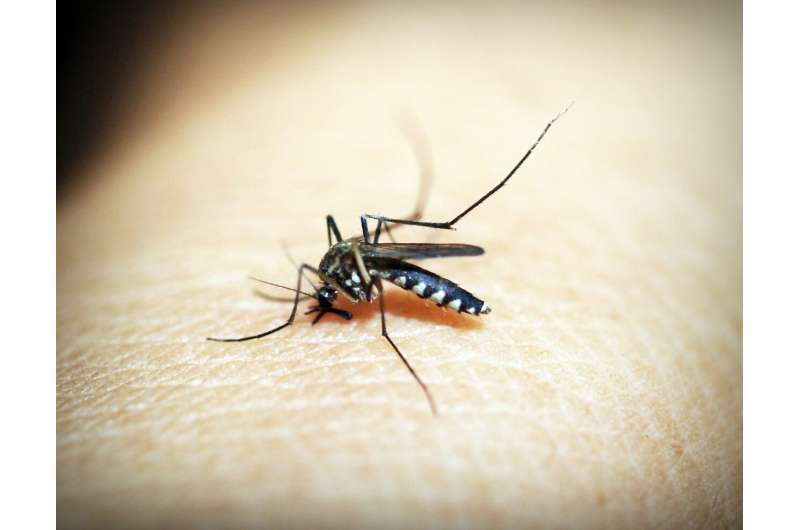This article has been reviewed according to Science X's editorial process and policies. Editors have highlighted the following attributes while ensuring the content's credibility:
fact-checked
trusted source
proofread
Protein from mosquitoes could help control dengue virus infection

NUS scientists have revealed the structure and function of a pupal cuticle protein found in the exoskeleton—a hard covering that supports and protects the bodies of some types of invertebrate animals, especially arthropods—of Aedes aegypti mosquitoes, and scientific advancement could one day help prevent dengue virus infection.
Dengue virus—from the genus flavivirus—causes dengue fever in humans and is spread from a bite of an infected female Aedes aegypti mosquito. In 2023, over 5 million cases of dengue fever were reported globally. Currently, there is no specific treatment for dengue fever and the only dengue vaccine available, namely Dengvaxia, is for children who have previously been infected with dengue virus and living in areas where dengue is common.
Professor J Sivaraman and his team from the Department of Biological Sciences under the NUS Faculty of Science, set out to shed light on how cuticle proteins found in Aedes aegypti mosquitoes can prevent and control the infection of a mosquito-borne virus—dengue virus.
The findings, which were published in Protein Science, suggest the potential of this cuticle protein as a target for developing innovative methods to control dengue virus infection.
An unlikely ally
Despite its role as a carrier of the dengue virus, the female Aedes aegypti mosquito could possess the key to discovering new anti-viral strategies to control dengue virus infection.
Previous research has found that cuticle proteins from this same mosquito play a part in blocking infection of mosquito-borne viruses, such as Zika virus and West Nile virus, by interacting with the proteins on the surface of these viruses.
Dengue virus is classified into four varieties: DENV-1, DENV-2, DENV-3 and DENV-4. For this study conducted at NUS, the team explored—at the molecular level—how a cuticle protein blocks the infection of the DENV-2 variety into host cells.
To begin exploring the role of the cuticle protein in inhibiting dengue virus infection, the NUS scientists employed a technique known as Nuclear Magnetic Resonance (NMR) spectroscopy which uses a powerful magnetic field to analyze the molecular structure of the cuticle protein, and found that the protein takes on a disordered structure.
Further examination of the molecular interactions between the cuticle protein and dengue virus prompted the NUS team to suggest that it blocks dengue virus infection using a two-pronged approach.
First, the cuticle protein obstructs dengue virus infection by directly attaching to the virus, which causes the virus to clump and inhibit the dengue virus from interacting with the host cells to prevent a viral infection. During their analysis, NUS scientists identified the specific locations where the interactions between the cuticle protein and the virus take place.
Second, the cuticle protein can prevent dengue virus infection through interactions with immune cell surface receptors and may play a role in presenting the dengue virus antigen to immune cells as an anti-viral strategy to block viral recognition and attachment.
"The findings indicate that pupal cuticle protein is a potential target for developing inhibitors or antibodies to control dengue virus infection. These insights contribute to understanding the molecular dynamics of mosquito-virus interactions and open avenues for novel anti-viral strategies," said Prof Sivaraman.
The next step for these researchers is to identify how pupal cuticle proteins prevent dengue virus infection in mosquitoes and mammals, and to explore the possibility of pupal cuticle proteins as a new anti-viral strategy not only against dengue virus but also in other flaviviruses like West Nile virus and yellow fever virus.
More information: Qingqing Huang et al, Structural and functional characterization of Aedes aegypti pupal cuticle protein that controls dengue virus infection, Protein Science (2023). DOI: 10.1002/pro.4761
Provided by National University of Singapore




















